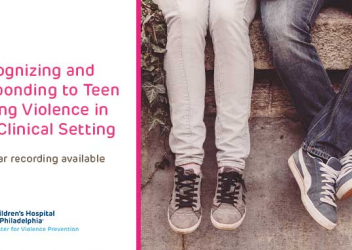Research In Action
Research In Action
Breadcrumb

Intimate partner violence (IPV), also known as domestic violence or domestic abuse, is a pattern of behaviors that is used to gain or maintain power and control over an intimate partner. According to the CDC, 1 out of 3 women and 1 out of 4 men experience IPV at some point in their lives.
Abusive partners have used isolation and monitoring behaviors to attempt to control a partner long before the COVID-19 pandemic, but social distancing, working from home, and stay at home orders have only worsened these behaviors. We also know that the medical setting is often the only place IPV survivors are allowed to go, and their medical provider might be the only person they are able to speak with privately. How will the shift from in-person to telehealth visits as a result of the pandemic affect survivors of IPV?
Telehealth Is Here To Stay
With the Medicaid expansion of telehealth visits, stay at home orders and virtual options, telehealth is changing the way that we participate in health care. In a survey of 2,000 Americans:
- Fewer than 20% had ever had a telehealth visit prior to March 2020; a year later, more than 61% had undergone a telehealth visit.
- Almost 88% reported a desire to continue using telehealth for non-urgent medical appointments even after the pandemic is over.
With Telehealth, Assessing for IPV Is Crucial
Clinicians need to keep assessing for family violence especially as the world becomes more virtual. However, there are many reasons why clinicians hesitate to do so. Logistically, how do you keep a survivor safe if privacy is such a concern and digital monitoring prevents many from asking about IPV? Practically, how do you respond to an affirmative response?
Here are some tips for asking patients about IPV during telehealth encounters.
Always assess for privacy. Offer to call back at a different time if desired. Privacy cannot be fully guaranteed, so always follow the patient’s lead.
- Ask if each caregiver is able to talk, and assess for privacy: “Are you alone? Is anyone else able to hear this call?”
- Normalize these questions: “We always have these conversations in private so we can speak freely without kids hearing”, or “HIPPA laws require that we have these conversations in private.”
Explain confidentiality and limits. Remind the patient/caregiver about your confidentiality, including the limits. Know your state’s specific reporting requirements and laws related to the adult survivors of IPV and children who have witnessed IPV.
Offer universal education rather than screening. We hear from survivors that asking specific questions about IPV is very helpful during in-person visits, but it may not be safe to do so during a virtual visit. Because of this, we encourage clinicians to provide universal education about IPV to all families and send general resources that include information about IPV. Always follow the survivors’ lead since they know what is more likely to put them in danger. Offer resources to every family, but only send the information if the patient or caregiver gives permission to do so.
- “Before we get started, I want to say that I know COVID-19 has increased stress in all kinds of ways. We are seeing an increase in violence in the home which might look like physical violence, hitting, pushing, throwing objects, or might be more emotional and verbal. It might look like someone being very jealous, putting someone down, controlling who they talk to or where they go, or even stalking them. We are providing this information to everyone because we know that this affects our patients and their caregivers’ health. Would it be okay if I sent some resources for you to have and to share with others? It will also include information stress reduction, food access, and other services."
Respond with empathy. If a survivor discloses violence to you, remember that you might be the first person to which this information has been shared, and yours might be the first kind word heard in a long time.
- “Thank you for sharing this with me– this sounds really hard, and I know it can be difficult to talk about this.”
- “No one deserves to be treated that way.”
- “I am so sorry this is happening to you. Unfortunately, a lot of the families we care for experience things like this, but the good news is there are people who can help.”
Additional Resources
- Visit the National Coalition Against Domestic Violence to find your state/territory coalition and local domestic violence program(s).
- If you or someone you know needs help, call the National Domestic Violence Hotline at 1−800−799−7233 or visit www.thehotline.org
- Resources for Survivors During COVID-19
- Advocating for IPV Screening





